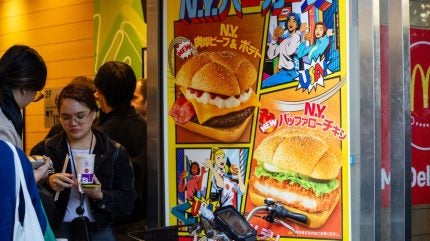
McDonald’s Japan will begin phasing out paper straws and introducing 100% recycled PET (rPET) strawless lids for cold drinks nationwide from Wednesday, 19 November 2025.
The shift to strawless lids—designed so customers can drink directly from the cup—forms part of a broader packaging plan the company says will cut the use of virgin plastic by about 6,600 tonnes a year between 2022 and 2025.

Discover B2B Marketing That Performs
Combine business intelligence and editorial excellence to reach engaged professionals across 36 leading media platforms.
McDonald’s Japan Inc., headquartered in Tokyo’s Shinjuku ward and led by president and CEO Thomas Ko, outlined the measures in an update dated 27 October 2025.
Switch to strawless lids begins on 19 November
The new rPET strawless lid will be used on paper cups for cold drinks and will replace the current lid-and-straw set-up.
According to the company, the lid has been in development for more than three years to meet the needs of in-store, takeaway, delivery and drive-through orders. The design includes a drinking spout intended to open easily while resisting accidental leaks in transit.
For carbonated beverages, the lid is built to limit liquid “blow-out” caused by pressure changes during movement. As the rollout progresses nationwide, paper straws will be discontinued in sequence.

US Tariffs are shifting - will you react or anticipate?
Don’t let policy changes catch you off guard. Stay proactive with real-time data and expert analysis.
By GlobalDataThe move places “strawless lids”, “rPET” and “recycled PET” at the centre of McDonald’s Japan’s single-use plastic reduction strategy.
Company targets cut of about 6,600 tonnes of virgin plastic a year
McDonald’s Japan says it has been reviewing containers and packaging materials since 2022 with the aim of prioritising renewable, recycled or certified inputs.
The series of changes—culminating in the introduction of rPET strawless lids—are expected to reduce the annual use of virgin plastic by roughly 6,600 tonnes once fully implemented.
The company frames the transition as part of a multi-year plan running through 2025, aligning with broader retail trends on plastic reduction, packaging optimisation and circular materials.
Biomass plastic carrier bags expand nationwide
From 19 November, stores across Japan will also begin switching their takeaway carrier bags to versions made with 95% biomass plastic, replacing bags previously made with 50% biomass content.
The higher-content bags were trialled earlier in 2025 across all McDonald’s outlets in Nagasaki Prefecture (23 locations, excluding the Sasebo Air Base store). The company reports that durability and usability were equivalent to the earlier bags, paving the way for national deployment.
Customers are encouraged to decline a bag when not needed as part of ongoing efforts to reduce packaging waste.
Happy set materials move to certified paper and away from virgin plastic
Beyond drinks packaging and carrier bags, McDonald’s Japan says it is working to move all Happy Set® toys to renewable, recycled or certified materials by the end of 2025.
As part of that effort, the company switched its picture books—introduced with Happy Set in March 2025—from a hardcover format using virgin plastic to a softcover made from FSC-certified paper.
The book packaging likewise changed from plastic to an FSC-certified paper bag.
These measures add to the company’s stated goals around virgin plastic reduction and responsible sourcing in its family and kids’ ranges.





